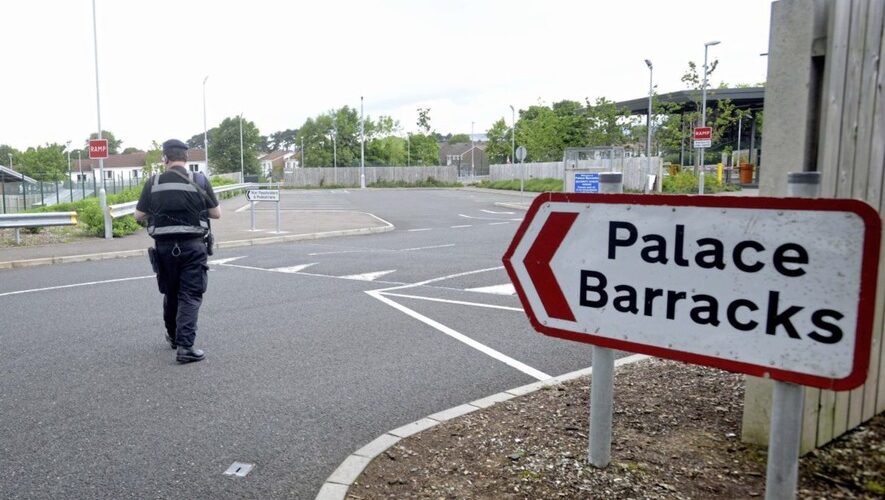Next year the unashamedly right-wing and sectarian Orange Order will mark the centenary of the creation of the Northern Ireland statelet with “a massive number of events,” the centrepiece of which will be a huge parade from Stormont in May 2021. It behoves all on the Irish left to analyse the immediate future for this “failed political entity” and to task ourselves with educating Irish workers on the lessons to be drawn from partition, sectarianism, and the imperialist domination of our country.
Stormont’s Department for Communities revealed in May 2020 that 19 per cent of people in “Northern Ireland” live in relative poverty, including approximately 107,000 (24 per cent) children. Previously the department published a biannual summary of homelessness statistics that showed that 9,673 people in the North were described as homeless last year.
At the beginning of 2020, before the social and economic upheaval wrought by the covid-19 pandemic, the BBC reported that “Northern Ireland” now has “the highest suicide rate in the UK,” with five people taking their life each week.
Statistics like these, however, are unlikely to dampen the enthusiasm of the sectarian statelet’s diminishing band of cheerleaders as they take to the streets in 2021 to mark a hundred years of sectarian bigotry, corruption, economic decline, and armed conflict that has resulted in thousands of deaths and injuries.
Against the backdrop of the forthcoming centenary, the minister of agriculture, Edwin Poots, recently dog-whistled to the communally divided population of the Six Counties that the transmission of the covid-19 virus was six times higher in “nationalist areas” of the jurisdiction.
In 2013, as minister of health, Poots banned blood donations from gay people, saying, “I think that people who engage in high-risk sexual behaviour in general should be excluded from giving blood.” Incidentally, the esteemed minister is also a “young earth creationist,” who believes that the earth was “created” in 4000 BC, an analysis that was sufficient to see him awarded the post of minister for the environment in a previous Stormont Executive.
Socialists were quick to point out that areas experiencing unusually high transmission of the potentially deadly covid virus in the North correlated to areas of multiple deprivation. Derry—“Northern Ireland’s second city”—has some of the worst deprivation indicators in western Europe.
Attempts to show the correlation between the prevalence of low-wage front-line employment in working-class areas and the spread of covid-19 among the community were but background noise to the cacophony of tit-for-tat sectarian exchanges between unionist and nationalist representatives, egged on by mainstream media commentators with a pro-imperialist agenda.
Concerted attempts to divide workers on sectarian lines have been a feature of the Northern state since its inception. An entity founded on the very basis of a sectarian head count was unlikely ever to escape the strictures of its very raison d’être.
Nevertheless Northern workers have on occasion broken free of the shackles imposed by sectarian leaders and tribal loyalties. In 1932 thousands of workers, Protestant and Catholic, went on strike throughout Belfast while tens of thousands packed the streets in front of the City Hall to listen to speakers from communist and labour backgrounds lay out their demands for welfare and a living wage. One speaker declared: “Let our slogan be ‘No surrender to poverty, misery, and destitution.’”
A window in that same City Hall commemorates the heroism and courage of those workers from both traditions in the North who joined the International Brigades to defend the Spanish Republic against the fascist uprising.
An anti-sectarian consciousness was again briefly raised among a section of Northern workers in the heady early days of the civil rights movement in the late 1960s. Not surprisingly, the trusty old Orange card was once again dusted off and employed to lethal effect by unionism and its imperial puppet-masters.
The few but inspiring instances of working-class unity among Northern workers in the last hundred years should be the real story in commemorating the beleaguered history of the sectarian statelet.
It’s clear to all but the wilfully blind that partition, sectarianism and the capitalist system of economic relations in Ireland are hampering efforts to contain the spread of the covid pandemic. Working people in the North of Ireland deserve better than sectarian cat-calling and should immediately join the demand for a fully equipped and fully resourced all-Ireland national health service, free at the point of use and funded by progressive general taxation in addition to wealth taxes.
In the coming period the onus is on communists, socialists, left republicans, trade unionists and other progressives to use the centenary of the imposition of a British border in Ireland not merely to expose the catastrophic influence of imperialism, north and south, but to unite and organise working people around the demand for a new, secular republic for all our people: an anti-sectarian, anti-imperialist workers’ republic.
References and further reading
- BBC News, “Suicide prevention ‘top priority,’ health minister,” 21 January 2020 (https://www.bbc.com/news/uk-northern-ireland-51177099).
- Steve Bradley, “Why is Derry so poor, and why is nothing being done about it? (Part I),” 9 March 2018 (https://sluggerotoole.com/2018/03/09/why-is-derry-so-poor-and-why-is-nothing-being-done-about-it-part-i/).
- Department for Communities, “Poverty” (https://www.communities-ni.gov.uk/articles/poverty).
- Michael Farrell, Northern Ireland: The Orange State (1987).
- Neil Hegarty, “When Belfast’s Catholics and Protestants rioted together,” Irish Times, 2 September 2017 (https://www.irishtimes.com/culture/books/when-belfast-s-catholics-and-protestants-rioted-together-1.3200941).
- Sam McBride, “Orange Order’s plan to mark Northern Ireland centenary revealed: A huge Stormont parade, fireworks, gardens and more,” News Letter, 23 October, 2020 (https://www.newsletter.co.uk/news/politics/orange-orders-plan-mark-northern-ireland-centenary-revealed-huge-stormont-parade-fireworks-gardens-and-more-3013093).
- Seán Mitchell, Struggle or Starve: Working-Class Unity in Belfast’s 1932 Outdoor Relief Riots, Chicago: Haymarket Books, 2017.
- Public Health Agency, “Poverty” (https://www.publichealth.hscni.net/directorate-public-health/health-and-social-wellbeing-improvement/poverty).
- Paul Stewart, Tommy McKearney, Gearóid Ó Machail, Patricia Campbell, Brian Garvey, The State of Northern Ireland and the Democratic Deficit: Between Sectarianism and Neoliberalism (2019).






